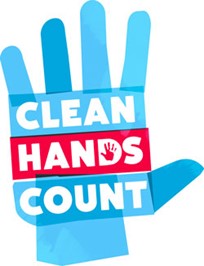Clean Hands Count

Have you taken your handwashing routine to new heights during the COVID-19 pandemic? That’s great! Keep up the good work.
Unfortunately, 42 percent of respondents in a recent poll said they had lapsed in their hand washing practices. Pandemic burnout is cited as a common reason. Hand washing is critical, in addition to wearing a mask in public and practicing physical distancing, in reducing infection transfer.
Even though COVID-19 vaccines are available and many of us have taken advantage of this added protection, COVID variants are another concern. The practice of regular and proper hand hygiene is a must. These habits have also contributed to the lower rates of influenza and flu deaths over the past season.
As restaurants and sports arenas open, as schools return to in-person learning, and as we return to office environments, we need to be especially vigilant in our hand hygiene practices. Don’t let pandemic fatigue negatively impact these infection control practices. Your health and that of others depend on it.
May 5 is World Hand Hygiene Day
 This year’s World Hand Hygiene Day is focused on healthcare providers. On average, healthcare providers perform hand hygiene less than half of the times they should. Routine, proper hand washing is essential to infection prevention.
This year’s World Hand Hygiene Day is focused on healthcare providers. On average, healthcare providers perform hand hygiene less than half of the times they should. Routine, proper hand washing is essential to infection prevention.
When you are in a healthcare setting, don’t be timid about asking your healthcare provider to clean their hands if you have concerns.
Let this also serve as a gentle reminder to each of us to continue doing the following to ensure we are doing our part to for infection prevention:
- Wash your hands properly and regularly.
- When soap and water aren’t available, use hand sanitizer that contains at least 60% alcohol.
- Click here for the CDC’s FAQs about Hand Hygiene.
You may find this two-page flier helpful, too: Handwashing at Home, at Play, and Out and About
 Contributor Keri Pollock directs marketing and communications for Aging Wisdom, a care management, consultation, and creative engagement practice based in Seattle. She is a member of the Age Friendly Coalition for Seattle and King County and serves on the Advisory Committee of the Frye Art Museum Creative Aging Programs and the Marcomm Council of the Alzheimer’s Association, Washington State Chapter.
Contributor Keri Pollock directs marketing and communications for Aging Wisdom, a care management, consultation, and creative engagement practice based in Seattle. She is a member of the Age Friendly Coalition for Seattle and King County and serves on the Advisory Committee of the Frye Art Museum Creative Aging Programs and the Marcomm Council of the Alzheimer’s Association, Washington State Chapter.
This article originally appeared in the May 2021 issue of AgeWise King County.
![Aging & Disability Services for Seattle & King County [logo]](https://www.agingkingcounty.org/wp-content/themes/sads/images/seattle-ads-logo.png)